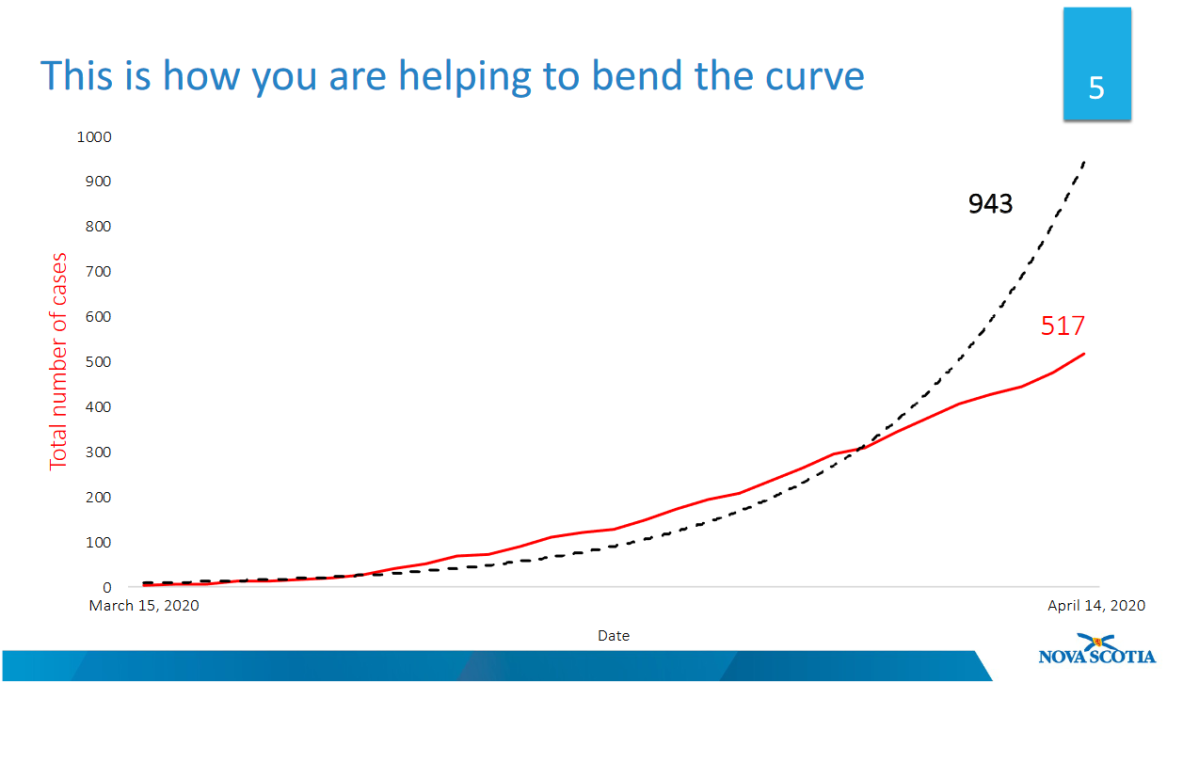If Nova Scotians decide to ignore public health measures there could be over 6,200 cases of COVID-19 in Nova Scotia by the end of June, according to projection modelling released by the province.

During Tuesday’s press briefing, chief public health officer Dr. Robert Strang said the number of cases Nova Scotia will receive all depends on how Nova Scotians comply with public health measures.
READ MORE: Third death recorded in Nova Scotia as case total hits 474
There are currently 517 cases of COVID-19 in Nova Scotia, as the province announced 43 more on Tuesday. Strang said without strict public health measures in place, the province would likely be at 943 cases.

Strang said if residents stick to following public health measures, the province could be at around 1,453 cases by June 30. With poor compliance, Strang said it could reach 6,269.
The modelling projects there could be 35 hospitalizations at the peak of the virus’s curve with good compliance, but could reach 85 with poor compliance.

Get weekly health news
McNeil said poor compliance could put the province’s health-care system at risk, which is something that keeps him up at night.
“If we follow public health advice, we have capacity to be able to deal with all the issues coming in our facilities across the province,” he said. “Our poor compliance issue would put our system in the same kind of jeopardy as you see in other provinces.”
“The fact we were able to get out in front of this … will allow our system to be able to manage COVID-19 in our province.”
Strang said the figures show that what the province is doing and how Nova Scotians are complying is making a difference.
READ MORE: Resident at Dartmouth long-term care home dies after COVID-19 diagnosis
The province did not release projections on how many Nova Scotians could die from COVID-19.
Biggest one-day spike in cases
The 43 cases identified on Monday is the biggest one-day the province has seen so far.
The total breakdown of where cases have been identified in Nova Scotia is as follows:
- Central zone: 397
- Western zone: 46
- Eastern zone: 40
- Northern zone: 34
- Head-Smashed-In Buffalo Jump heritage site enjoys boost after shout out on ‘The Pitt’
- What is Nipah virus? What to know about the disease as India faces outbreak
- Pizza Pops contaminated with E. coli tied to 7 hospitalizations, data shows
- Pizza Pops E. coli recall grows as roughly a dozen products now hit
The QEII Health Sciences Centre’s microbiology lab completed 1,476 Nova Scotia tests on Monday. To date, Nova Scotia has 16,755 negative test results.
There are now 10 patients in hospital, with four in an intensive care unit. There were nine in hospital on Monday.
Forty-seven per cent of cases involve male patients and 53 per cent involve female patients.
Travel has been removed as a screening requirement to get a COVID-19 test. Now, if you have two or more of the following symptoms, you’re able to get a COVID-19 test.
- fever
- new or worsening cough
- runny nose
- headache
- sore throat
13 new cases at Northwood
During Tuesday’s press briefing, Strang confirmed that of the 43 new cases in Nova Scotia, 13 are from the Northwood long-term care facility in Halifax.
Strang said he had spoken with the director at Northwood earlier in the day to confirm the proper steps are being put in place.
“We continue to see a lot of cases, but that’s because they’re doing a lot of testing,” said Strang.
There are a total of 31 residents who have tested positive for COVID-19 at the long-term care facility. Ten staff members have also tested positive, as well as four home support workers and two health services staff.
Strang said all the residents except one have mild symptoms or are asymptomatic.
Questions about COVID-19? Here are some things you need to know:
Health officials caution against all international travel. Returning travellers are legally obligated to self-isolate for 14 days, beginning March 26, in case they develop symptoms and to prevent spreading the virus to others. Some provinces and territories have also implemented additional recommendations or enforcement measures to ensure those returning to the area self-isolate.
Symptoms can include fever, cough and difficulty breathing — very similar to a cold or flu. Some people can develop a more severe illness. People most at risk of this include older adults and people with severe chronic medical conditions like heart, lung or kidney disease. If you develop symptoms, contact public health authorities.
To prevent the virus from spreading, experts recommend frequent handwashing and coughing into your sleeve. They also recommend minimizing contact with others, staying home as much as possible and maintaining a distance of two metres from other people if you go out.
For full COVID-19 coverage from Global News, click here.










Comments